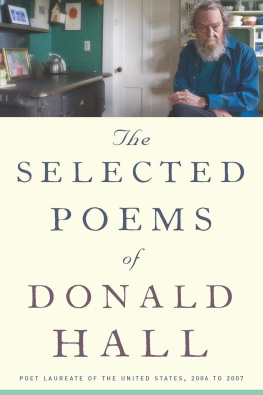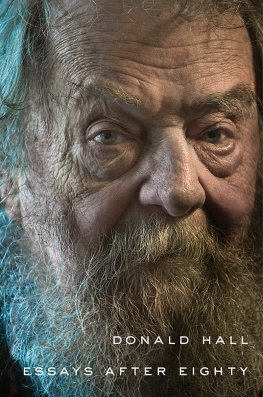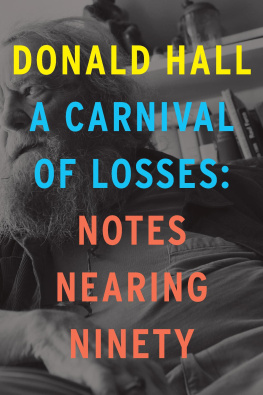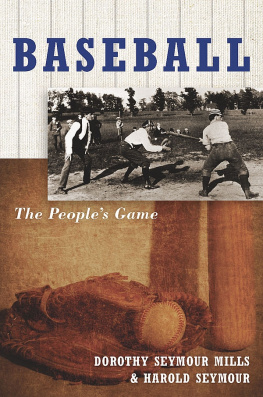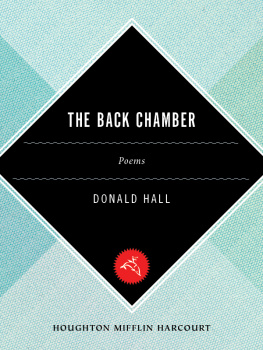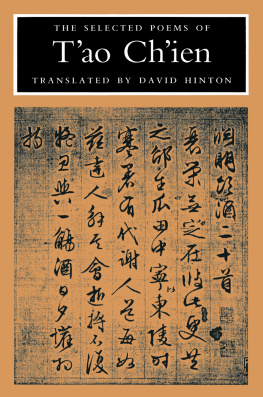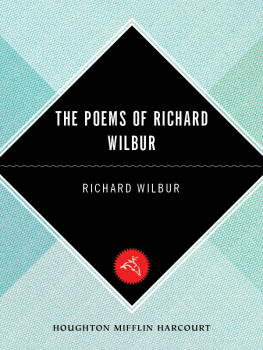Copyright 2015 by Donald Hall All rights reserved For information about permission to reproduce selections from this book, write to or to Permissions, Houghton Mifflin Harcourt Publishing Company, 3 Park Avenue, 19th Floor, New York, New York 10016. www.hmhco.com The Library of Congress has cataloged the print edition as follows: Hall, Donald, date. [Poems. Selections] The selected poems / of Donald Hall. pages ; cm ISBN 978-0-544-55560-0 (hardcover) ISBN 978-0-544-55561-7 (ebook) I. PS 3515. PS 3515.
A 3152 A 6 2015 811'.54dc23 2015004341 Cover design by Jackie Shepherd Cover photograph David Mendelsohn v1.1215 Andrew HallPhilippa Smith
My Son My Executioner
My son, my executioner, I take you in my arms, Quiet and small and just astir And whom my body warms. Sweet death, small son, our instrument Of immortality, Your cries and hungers document Our bodily decay. We twenty-five and twenty-two, Who seemed to live forever, Observe enduring life in you And start to die together.
The Sleeping Giant
a hill in Connecticut The whole day long, under the walking sun That poised an eye on me from its high floor, Holding my toy beside the clapboard house I looked for him, the summer I was four. I was afraid the waking arm would break From the loose earth and rub against his eyes A fist of trees, and the whole country tremble In the exultant labor of his rise; Then he with giant steps in the small streets Would stagger, cutting off the sky, to seize The roofs from house and home because we had Covered his shape with dirt and planted trees; And then kneel down and rip with fingernails A trench to pour the enemy Atlantic Into our basin, and the water rush, With the streets full and all the voices frantic. That was the summer I expected him.
Later the high and watchful sun instead Walked low behind the house, and school began, And winter pulled a sheet over his head.
The Lone Ranger
Anarchic badlands spread without a road, And from the river west no turned-up loam; No farmer prayed for rain, no settlers horse But one time blundered riderless to home. Unfriendly birds would gather in the air, A circling kind of tombstone. As for the law, No marshal lived for long unless he could Defeat his mirrord image to the draw. So now he rode upon a silver horse. He stood for law and order.
Anarchy Like flood or fire roared through every gate But he and Tonto hid behind a tree And when the bandits met to split the loot, He blocked the door. With silver guns he shot The quick six-shooters from their snatching hands And took them off to jail and let them rot. For him the badlands were his mothers face. He made an order where all order lacked From Hanged Boy Junction to the Rio Grande. Why did he wear a mask? He was abstract.
Christmas Eve in Whitneyville
December, and the closing of the year; The momentary carolers complete Their Christmas Eves, and quickly disappear Into their houses on each lighted street.
Each car is put away in each garage; Each husband home from work, to celebrate, Has closed his house around him like a cage, And wedged the tree until the tree stood straight. Tonight you lie in Whitneyville again, Near where you lived, and near the woods or farms Which Eli Whitney settled with the men Who worked at mass-producing firearms. The main street, which was nothing after all Except a school, a stable, and two stores, Was improvised and individual, Picking its way alone, among the wars. Now Whitneyville is like the other places, Ranch houses stretching flat beyond the square, Same stores and movie, same composite faces Speaking the language of the public air. Old houses of brown shingle still surround This graveyard where you wept when you were ten And helped to set a coffin in the ground. You left a friend from school behind you then, And now return, a man of fifty-two.
Talk to the boy. Tell him about the years When Whitneyville quadrupled, and how you And all his friends went on to make careers, Had cars as long as hayracks, boarded planes For Rome or Paris where the pace was slow And took the time to think how yearly gains, Profit and volume made the business grow. The things I had to miss, you said last week, Or thought I had to, take my breath away. You propped yourself on pillows, where your cheek Was hollow, stubbled lightly with new gray. This love is jail; another sets us free. Tonight the houses and their noise distort The thin rewards of solidarity.
The houses lean together for support. The noises fail, and lights go on upstairs. The men and women are undressing now To go to sleep. They put their clothes on chairs To take them up again. I think of how, All over Whitneyville, when midnight comes, They lie together and are quieted, To sleep as children sleep, who suck their thumbs, Cramped in the narrow rumple of each bed. They will not have unpleasant thoughts tonight.
They make their houses jails, and they will take No risk of freedom for the appetite, Or knowledge of it, when they are awake. The lights go out and it is Christmas Day. The stones are white, the grass is black and deep. I will go back and leave you here to stay Where the dark houses harden into sleep.
An Airstrip in Essex, 1960
It is a lost road into the air. It is a desert among sugar beets.
The tiny wings of the Spitfires of nineteen forty-one sink under mud in the Channel. Near the road a brick pillbox totters under a load of grass, where Home Guards waited in the white fogs of the invasion winter. Good night, old ruined war. In Poland the wind rides on a jagged wall. Smoke rises from the stones; no, it is mist.
The Long River
The musk ox smells in his long head my boat coming.
When I feel him there, intent, heavy, the oars make wings in the white night, and deep woods are close on either side where trees darken. I rowed past towns in their black sleep to come here. I passed the northern grass and cold mountains. The musk ox moves when the boat stops, in hard thickets. Now the wood is dark with old pleasures.
Love Is Like Sounds
Late snow fell this early morning of spring.
At dawn I rose from bed, restless, and looked Out my window, to wonder if there the snow Fell outside your bedroom, and you watching. I played my game of solitaire. The cards Came out the same the third time through the deck. The game was stuck. I threw the cards together, And watched the snow that could not do but fall.
White Apples
when my father had been dead a week I woke with his voice in my ear I sat up in bed and held my breath and stared at the pale closed door white apples and the taste of stone if he called again I would put on my coat and galoshes
The Alligator Bride
The clock of my day winds down.
White Apples
when my father had been dead a week I woke with his voice in my ear I sat up in bed and held my breath and stared at the pale closed door white apples and the taste of stone if he called again I would put on my coat and galoshes
The Alligator Bride
The clock of my day winds down.
The cat eats sparrows outside my window. Once, she brought me a small rabbit which we devoured together, under the Empire table while the men shrieked repossessing the gold umbrella. Now the beard on my clock turns white. My cat stares into dark corners missing her gold umbrella. She is in love with the Alligator Bride. Ah, the tiny fine white teeth! The Bride, propped on her tail in white lace stares from the holes of her eyes.
Her stuck-open mouth laughs at minister and people. On bare new wood fourteen tomatoes, a dozen ears of corn, six bottles of white wine, a melon, a cat, broccoli, and the Alligator Bride. The color of bubble gum, the consistency of petroleum jelly, wickedness oozes from the palm of my left hand. My cat licks it. I watch the Alligator Bride. Big houses like shabby boulders hold themselves tight in gelatin.
Next page
